Feeding an Under Weight Listless Senior Dog
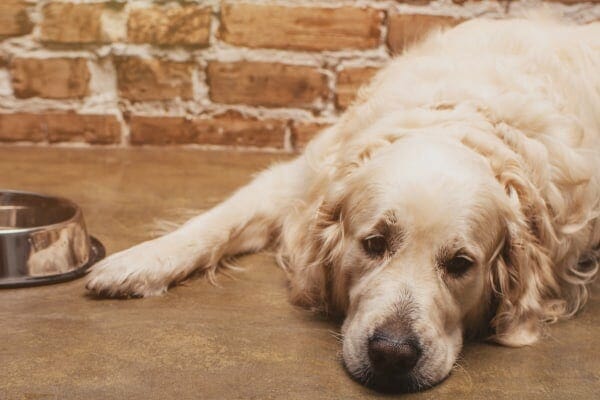
SUMMARY: If you're searching for answers to the question, "Why is my old dog not eating?" help is here. With a combined 30+ years of experience caring for senior dogs, veterinarians Dr. Erica Irish and Dr. Julie Buzby share helpful, actionable tips along with underlying causes for an older dog's loss of appetite.
When a concerned pet parent asks me why her beloved old dog is not eating, I look into the greying dog's eyes and ask myself, "What are you trying to tell us?" It's one of those times when I wish my patients could speak! To understand what might be going on when a dog's eating habits have changed, let's meet a senior dog named Boss and uncover the clues behind appetite loss in senior dogs.
When a dog refuses to eat: Boss' symptoms
Boss, a lovable Pit Bull/Shar-Pei senior dog, was a happy member of my sister's family. He enjoyed his meals and the occasional treat but was never a dog with a ravenous appetite. This made it more challenging to notice when his appetite diminished. But it wasn't until the day that he had a seizure—his first-ever—that he lost interest in food altogether.
My sister brought this to my attention right away, and I gave her a few suggestions to coerce Boss into eating his breakfast. As I made arrangements for his vet visit, my mind raced through all the underlying conditions related to this symptom.
Your dog's appetite is a critical clue
Wouldn't it have been great if Boss could have told me what was happening? This frustration is familiar to many dog owners.
But our dogs do give us clues.
When an older dog refuses to eat, the presence of other clinical signs can help direct dog owners and veterinarians in the search for answers. Consider the following three scenarios and potential underlying conditions when you think about your senior dog.
1. Your old dog is not eating or drinking: Is pain the underlying cause?
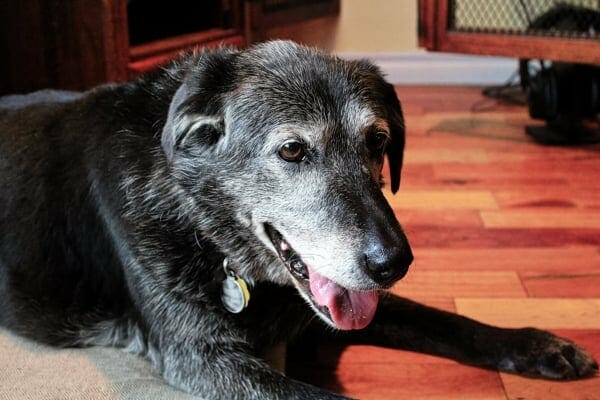
Let's consider a dog that is bright and alert but is reluctant to eat or drink water. Pain and discomfort are possible factors when additional clinical signs are not obvious.
Arthritis in dogs is a very common health issue. If your senior dog is suffering from arthritis pain, then you might see him limping or walking with stiffness. Could it be difficult for him to get up from his bed and navigate to his food and water dishes? You could try bringing his dishes bedside to see if this revives his interest in food.
If this seems to solve the issue, then your veterinarian can help you develop a pain management plan to improve your dog's mobility and willingness to move around your home. Furthermore, sometimes food and water bowls are located on slippery surfaces that can make it difficult for an older pet to traverse or feel stable while eating. ToeGrips® dog nail grips can improve traction and confidence on slippery surfaces in your home.
In addition to the pain of arthritis, don't discount dental disease and the subsequent oral pain as the reason a dog won't eat. Your dog's appetite might be just fine but if every bite hurts, he might learn to avoid the dishes altogether because he remembers that chewing caused pain.
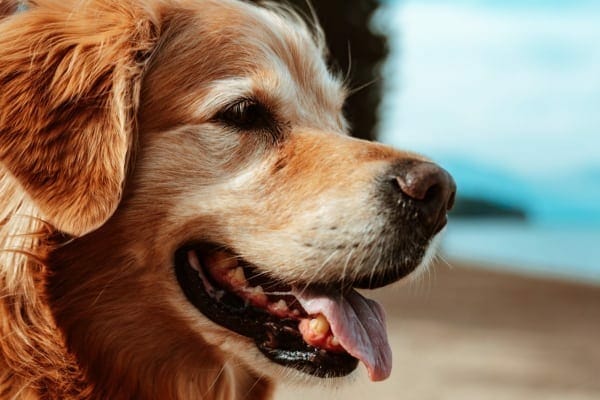
Dental disease was the underlying condition for a senior dog named Sister
A new canine patient of mine named Sister is the poster child for this PSA. Sister hasn't been eating well on and off for months. However, since she was 18 years old (yes, you read her age correctly), her conscientious mom was just trying to keep Sister comfortable. She brought Sister to me for acupuncture and appetite stimulants to help improve her quality of life.
When I met them in the parking lot, I was taken aback. I knew Sister was 18, but she pranced down the sidewalk toward me like she was a youngster at Westminster! Her physical exam was unremarkable (very happy news for 18!), and her bloodwork looked great.
Sister's only issue was trench mouth—the veterinary slang term for tartar build-up, chronic infection, and inflamed gums. Her owner described the classic symptoms: Sister drooled when she ate and would sometimes not eat much for a couple of days. In light of her physical exam and lab results, I was convinced that her oral disease was the most likely reason behind her disinterest in food. Fortunately, it's a treatable one!
Her mom and I both teared up a little bit as I presented the option of seeing a specialist at a referral hospital for dental care under anesthesia, hopefully completely restoring Sister's interest in food. Yes, there's a risk to anesthesia for older dogs, but there's also a high likelihood of life-changing success for Sister. Her dental procedure is scheduled later this month, and I will blog her journey, so stay tuned!
2. Your old dog is not eating and is sleeping a lot: Is it normal or a sign of a more serious condition?
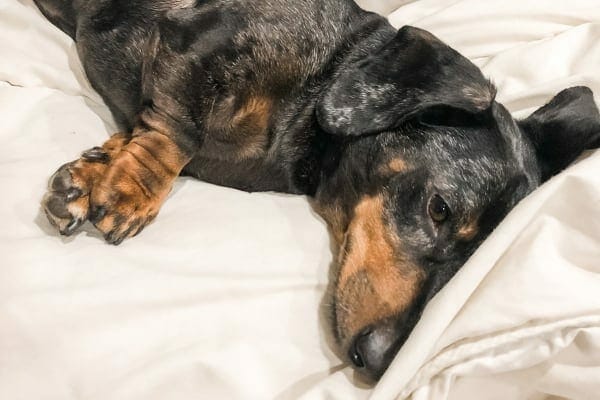
excessive sleepiness is a cause for concern.
It's important to note that older dogs tend to sleep a bit more than younger dogs. Since most senior dogs will develop arthritis, they may be less inclined to exercise. Burning fewer calories means that they will eat a little less than the standard adult dog. However, excessive sleeping and/or your old dog not eating is a cause for concern and warrants a phone call to your veterinarian. A complete tip-to-tail exam and lab work will usually yield answers.
Increased sleep and decreased appetite due to heart or lung disease
Breathing is a higher priority than eating. If your dog has heart or lung disease, then you might notice that he sleeps more than the typical senior dog. This is because his heart and lungs must work harder to get oxygen to other internal organs, so the brain might tell the body to slow down in order to play catch-up. Failure to provide the body with enough oxygen can result in respiratory distress, and your dog will not be able to eat well if he is having trouble breathing. If you've ever tried to close your mouth and chew with a stuffed up nose, you get the idea.
Increased sleep and decreased appetite due to canine cognitive dysfunction
Another possible contributing factor may be canine cognitive dysfunction (CCD), which is essentially doggie dementia. Older dogs with CCD can experience changes in their sleep-wake cycles, meaning that they can have shorter or longer periods of wakefulness and be restless at night. CCD may or may not directly affect your dog's appetite, but dogs with CCD who experience restlessness and anxiety may have very little appetite. If they are confused, then they may not remember where to find their food bowls. For more information and helpful tips, check out our article on "Managing Canine Cognitive Dysfunction in Dogs: Signs, Symptoms, Solutions".
3. Your old dog is not eating and is throwing up: Don't wait! Contact your veterinarian!
Vomiting can be a major concern regardless of a dog's age. Your veterinarian may advise a wait-and-see approach over the phone if vomiting happens just once. However, if your dog is vomiting multiple times a day and stops eating, contact your veterinarian immediately.
Vomiting, loss of appetite due to medications
Certain medications and supplements can cause vomiting due to an adverse reaction or irritation to the lining of the stomach. Antibiotics and pain medications—commonly prescribed to older dogs—can cause tummy upset as the number one side effect. If you suspect that your dog is having a problem with his medication, alert your veterinarian right away for recommendations. He or she may advise you to skip a dose or stop the medication altogether, but it is important to ask first because simply stopping a treatment regimen may be detrimental for your dog.
Vomiting, loss of appetite due to serious illness
Unfortunately, vomiting can also be a sign of serious illness. Pancreatitis, kidney disease, liver disease, diabetes, and even cancer can all cause vomiting. It is important to quickly identify the cause of your dog's illness in order to prevent further complications and maintain an excellent quality of life for your senior dog through appropriate treatment.
What are the next steps?
Your veterinarian is the best person to help you figure out why your old dog won't eat. After a thorough physical examination, he or she may recommend baseline blood and urine testing in order to make sure that your dog's internal organs are functioning correctly. A professional dental cleaning (with or without extractions) may be necessary if there is evidence of dental disease. If your dog is having breathing problems, your vet may recommend chest X-rays to evaluate the heart and lungs. If lab work is unremarkable, then your veterinarian may recommend further diagnostic testing to get to the bottom of the issue or conservative supportive care to maintain hydration, reduce nausea, and promote comfort.
What else can you do to help a dog who's not eating?
As a conscientious pet parent, I know you worry when your dog is not eating. I joke with my clients about the daily tracking of pee, poop, and food intake that we all subconsciously track in our pets. If our dogs are failing to eat, we feel like we are failing them as their caretakers. As veterinarians, we recommend "tricks" to tempt a dog who isn't eating to take a few bites. However, the emphasis must be on discovering the underlying cause of the loss of appetite, as discussed above.
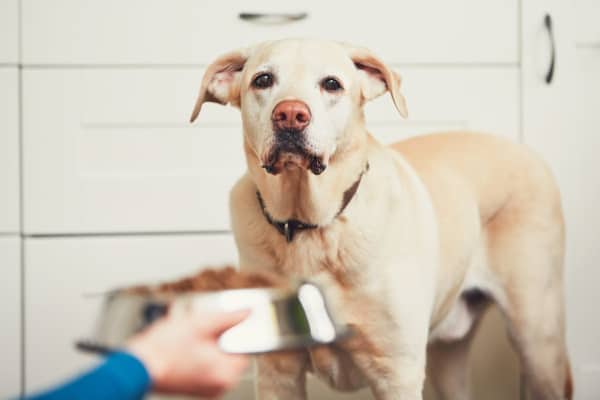
If your grey-muzzled companion is having trouble eating dry dog food or simply isn't interested, then offering wet food or soaking the dry kibble in some warm water can help encourage him to eat. Adding chicken breast or lean ground beef (drained) might also make food more enticing. In some cases, your vet might tell you to offer your dog some baby food products because they are easy to digest and have lots of different flavors to try. (Just be sure to avoid products that contain onion powder which is toxic to dogs).
In certain circumstances, your veterinarian may advise you to use a syringe to feed your dog. Also, your vet may recommend a feeding tube for at-home use if your dog is recovering from a serious illness that required hospitalization. It can seem daunting, but your veterinarian will walk you through the steps and answer all your questions.
For a senior dog who needs a little help regaining an interest in food after an illness or due to declining health, your vet might prescribe an appetite stimulant like mirtazepine. Also known as Remeron, mirtazepine is an inexpensive, safe, once-a-day pill that has been very helpful for my patients. Although it is prescribed as an antidepressant in humans, it functions as an appetite stimulant in dogs. A new veterinary prescription drug called Entyce is now available as an FDA-approved appetite stimulant for dogs.

Back to Boss' story
As much as I wish that Boss' story had a happy ending, life's twists and turns don't always go that way. After we brought my sister's dog to the hospital, we noticed that some of his lymph nodes below his neck were enlarged. Even though most of his blood and urine testing was normal, we performed X-rays and found that his liver and spleen appeared enlarged. Boss' lymph nodes were aspirated and this confirmed that he had lymphoma, a type of cancer. Sadly, it was already at an advanced stage, affecting his internal organs.
My sister was worried about the effect that chemotherapy might have on Boss' heart, so we elected to give him prednisone, a steroid, to keep him comfortable. Steroids like prednisone are powerful anti-inflammatories and can have the side effects of an increased appetite. On the day that we started the medication, Boss started eating once again! We focused on his quality of life, making sure he was happy and loved in his final weeks.
What can we learn from our beloved Boss-man's story? Boss had a very serious illness. By bringing him to be evaluated and tested as opposed to taking a "wait and see" approach, we were able to quickly figure out the cause and get Boss the care that he needed. He went back to acting like a puppy again the following day. Not only was he back to tossing his favorite stuffed toy in the air, but he was also back to eating all of his meals! Saying goodbye to Boss was very difficult, but we have fond memories and enjoyed spoiling him to the end.
If you're facing difficult end-of-life or critical care decisions for your beloved senior dog, here are some additional resources for you:
- Dr. Buzby's podcast: Cancer in Dogs With Dr. Sue, Cancer Vet
- Dr. Buzby's blog post: Saying Goodbye to Our Dog
Trust your intuition and team with your vet
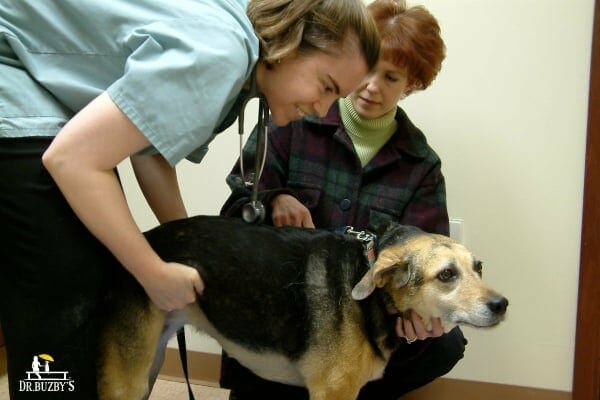
about changes in your senior dog's eating habits.
Finally, you know your dog's routine best. You know what is normal and not normal. You know when there is a change in his appetite. If you sense that something is amiss, please contact your veterinarian right away. Your veterinarian will let you know if the signs you describe warrant an emergency visit or an appointment.
Even if you are not able to bring your dog to the vet on the same day, your vet may offer some words of wisdom to help improve your dog's appetite and overall happiness. Working closely with your veterinarian will bring you priceless peace of mind, and ensure the best plan to maintain your senior dog's health and wellbeing.
Has your dear old dog's appetite diminished?
Please comment below. We can all learn from each other.
Source: https://toegrips.com/old-dog-not-eating-causes-tips/
0 Response to "Feeding an Under Weight Listless Senior Dog"
Post a Comment